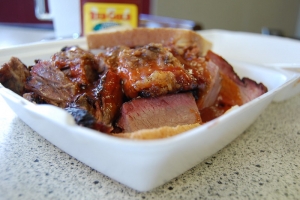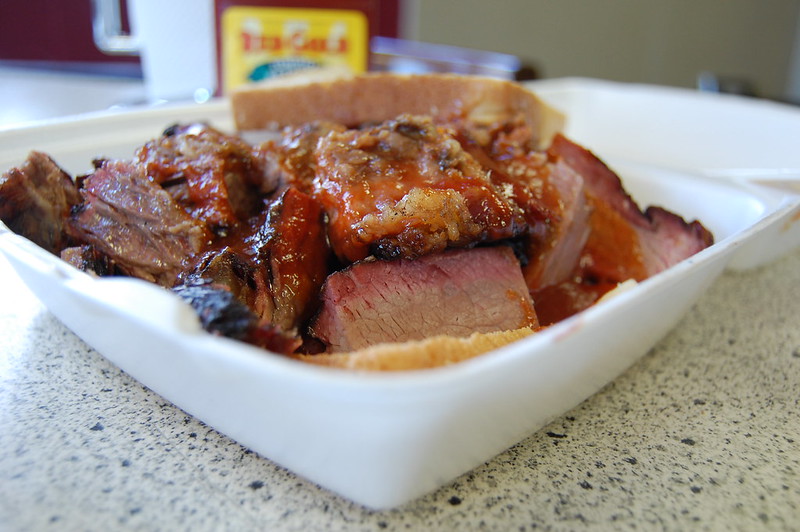All COVID-19 is Local, BBQ edition

Burnt Ends from LC’s BBQ in Kansas City
(photo by stu_spivak CC BY-SA 2.0)
Here in metro KC, our five county area that straddles the MO/KS border and the Missouri River did a relatively good job of shutting down, even in the face of state-level idiocy in both Topeka and Jefferson City. School buildings were closed, large gatherings were cancelled, and when the two states finally caught up and issued state-wide orders, it meant fairly little around here because metro KC had already done much of what was prescribed. It hasn’t all been easy, of course, but folks adjusted and life has gone on.
Now, though, things just got real.
From this morning’s featured story on the KC Star’s website (with emphasis added):
Arthur Bryant’s Barbecue lucked out with a hefty contract two months ago, securing 1,200 cases of brisket at a price of $2.45 per pound. As the pandemic began, meat prices actually dropped and the restaurant snagged another 400 cases at $1.75 per pound, said owner Jerry Rauschelbach.
He said those purchases mean Arthur Bryant’s will be set for the next several months. But they also show how fast the market has moved: brisket was selling for more than $6 per pound this week, he said.
At that price, menu prices would soar by the time the meat is trimmed, smoked and served.
“If I didn’t have brisket and I had to pay $6 a pound, I would take brisket and burnt ends off my menu,” he said. “There’s just no way I could consciously serve sandwiches at 20 bucks. There’s just no way.”
For the uninitiated, a brisket is a big slab of meat with two parts – the flat and the point. The point takes longer to cook properly, so the two parts are either split and cooked separately, or they are cooked together until the flat is done and then the point goes back into the pit. It has more connective tissue that needs longer time to break down, and when done right you get a dark “bark” on the surface of the meat and some of the most tender and flavorful deliciousness on the inside. They’re generally cut in cubes and served either on a plate or a sandwich and when done right, they are spectacular.
There’s a lot of folklore around BBQ and who invented different styles or cooking methods or what kind of sauce to use, and damn near every little thing about putting meat over a fire. The origin of selling burnt ends is not folklore or in doubt: they were invented at Arthur Bryant’s. The point of the brisket was seen for years as waste when you trimmed and cooked the brisket flat for sandwich slices, and the counterman at Bryant’s would cut the point in chunks and set it up on the counter for customers to nibble on while waiting to get to the front to order their food. (Note: Bryant’s has also been legendary for its lines.) Eventually they realized “Hey, we could sell this stuff!” and so they did. And then so did everyone else in town. [Time suck warning: that link goes to a 30 minute video that will introduce you not just to burnt ends, but to a good chuck of KC’s best BBQ joints as well.]
So I’ll say it again: things are getting real in KC when Arthur Bryant’s is even contemplating having to take burnt ends off the menu.
I do not want to dismiss what’s happening in hospitals and prisons and nursing homes. That’s as real as real gets. I know a lot of folks in a meatpacking town in southeast Kansas where a cluster of cases has emerged. Things got real there, really quickly, once that hit. What I am saying here is that KC takes its BBQ seriously — as seriously as the pope takes communion — and this nugget about Arthur Bryant’s BBQ is a very KC-specific cultural sign of just how deeply this pandemic is hitting. We can deal with closing our school buildings and postponing our April elections until June and even closing our church buildings, but burnt ends going off the menu of Arthur Bryant’s (even temporarily) would truly be a sign of the apocalypse.
But if BBQ is the way Kansas City identifies the the apocalypse, it’s also how KC identifies hope.
For several years, Jim White has been active in Operation BBQ Relief. which was founded in KC by a bunch of folks in the competition BBQ world. Over the last 9 years, OBR has expanded across the country, and their crews of volunteers have taken their cookers to areas hit by natural disasters, to feed both those hit by the disaster and the emergency workers who come in trying to deal with it. When I sent Jim, Marcy, Bmaz, and some others a link to the KC Star piece, Jim replied with a link to an April 8 press release about OBR and their newest project, Operation Restaurant Relief:
In addition to deploying their trademark effort of providing hot barbecue meals to those affected by natural disasters, Operation BBQ Relief launched a new program called Operation Restaurant Relief with great success last week in Kansas City.
The new initiative revives closed restaurants by utilizing their kitchens to provide free meals to those in need and those on the front lines. As part of the effort, the restaurants will rehire laid off workers to comply with the program and receive a stipend for their participation from Operation BBQ Relief.
Jim could tell you a lot more about OBR, but he’s got a very important matter to attend to at the moment* so unless/until he shows up in the comments, let me direct you to their website at the link above. He did share with me his impression that OBR is doing “pretty amazing work for a group that is populated with folks who lean to the more conservative side of things – sometimes very conservative. They are slowly learning empathy.” This sounded familiar, and sure enough, Jim wrote in more depth about this kind of empathy after he worked on a OBR mission in Wilmington, NC.
That’s another thing about BBQ. Here in KC, despite having a long and ugly history when it comes to race, BBQ is one of those things that does better when it comes to crossing racial divides, in part because some of the most respected historic BBQ joints around here are African American. Even if someone’s favorite ‘cue doesn’t come from Bryant’s or Gates or LC’s, these places get a lot of respect. Arthur Bryant’s and the original location of the Gates chain are in areas of KC that a fair number of white folk would never dream of entering — but they’ll go there happily to get their BBQ fix if that’s their favorite. Put it this way: BBQ lovers have very firm opinions about color and argue a lot about color, but they’re usually talking about the smoke ring when you cut the meat open or the overall doneness of what you’ve prepared, not the color of the cook’s skin or anyone else’s. And when people share a disaster response cooking line with folks who don’t look like themselves, it changes the way people see each other – that’s the empathy part.
Back in the day, I waited tables and washed dishes, so I know what restaurant life is like from the worker’s point of view. If you’ve got some money and are looking for a charity out there doing great COVID-19 work on the non-medical front, you could do a lot worse than Operation BBQ Relief and their restaurant relief program.
And if you’re a praying kind of person, you might pray that burnt ends do not disappear from the menu of Arthur Bryant’s.
Ever.
______
* Marcy, knowing what happens when BBQ lovers start talking BBQ, interrupted our email discussion before it could really get going, with the observation that this subject “would be a lovely post if any one of you had access to a blog.” Since I brought up the subject, I agreed I could write it up. Jim, for his part, begged off: “The BBQ site I hang out on is having a virtual cookoff. We had two weeks to submit an entry and I forgot to load up on interesting stuff to cook and submit. But we got a spaghetti squash in our CSA basket yesterday and I have some chicken breast and sweet peppers around. Gonna roast the squash and a bunch of veggies on the grill with the chicken and then make pasta sauce to go on it with the chicken.”
Jim may hold various heretical BBQ notions, but those words above comes from the heart of a true BBQ person. When your plans go awry (or you forget to follow them), you make do with what you’ve got — and that menu sounds delicious.

 CC BY-SA 2.0
CC BY-SA 2.0